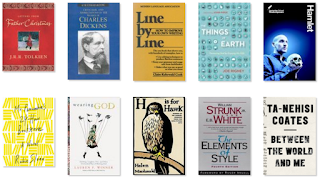Time for my annual summary of books I read this past year! As usual my favorite genre was history. I highly recommend The Kingdom of Ice, Rebel Yell, The Wright Brothers and Empire of the Summer Moon (probably in that order). Listening to the former in our cold January weather left a particularly deep impression!
I would also highly recommend Stuff Matters as an excellent and easily navigable read related to materials science. The World Without Us is a thought-provoking semi-scientific look at what the future could have been like.
I typically find Bill Bryson's books insightful, relaxing, and downright hilarious in places as I let my mind travel through time or around the world. This year was no exception. In addition to the books I recorded as having read, I listened to the audio version of Bryson's A Short History of Nearly Everything, which I had already read a decade or so ago. Just as good the second time around!
The Things of Earth is an excellent read helping us to orient our lives to appreciate all God has created and freely given us to enjoy. I look forward to reading future books by this author!
How about you? Did you read any of these or have other favorites to recommend? Please leave a comment below!
As for the format of books I read this year:
As for the format of books I read this year:
- 20 were audiobooks (most were free loans from the Maryland Digital Public Library; I'm so thankful for the availability of this service overseas!)
- 6 ebooks (all but one of which were also library loans)
- 5 hardbacks (2 of which were from the library)
- 8 paperbacks
According to www.goodreads.com, I am currently reading 16 other books but these will all have to wait for next year!










